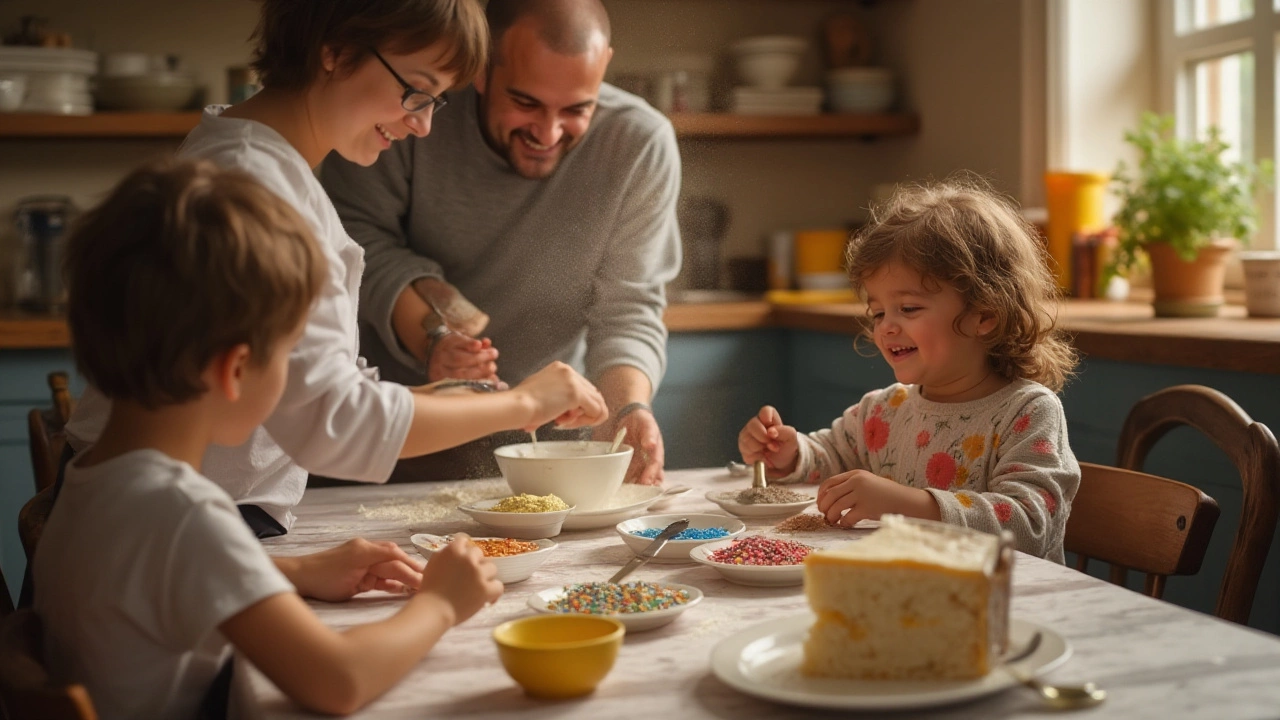
Baking a birthday cake can be one of the most joyous parts of a celebration. When you set out on this delicious journey, you might find yourself pondering whether to whip up a homemade creation or go the convenient route with a boxed cake mix. Each choice comes with its own charm and set of advantages, catering to different needs and skill levels.
Homemade cakes carry the allure of tradition, often filled with heirloom recipes and the comfort of knowing each ingredient. They allow for creativity and customization, whether you're considering a decadent chocolate layer cake or a light, fluffy sponge. On the other hand, boxed cake mixes deliver consistency with ease, offering dependable results that can be a lifesaver for those short on time or baking experience.
This article dives into the delicious world of cake-making, comparing the sensory delights and practical aspects of homemade and boxed cakes. It promises to equip you with knowledge and tips to decide which method will bring the most joy to your next birthday celebration.
- Understanding Homemade Cakes
- Exploring Boxed Cake Mixes
- Taste and Texture Comparison
- Time and Effort Considerations
- Nutritional Insights
- Tips for the Perfect Birthday Cake
Understanding Homemade Cakes
The allure of a homemade cake lies in its layers, not just of sugary delight, but of heart and history. For many, baking a cake from scratch is a cherished family ritual, passed down through generations like a treasured heirloom. The process, often lengthy and as intricate as it is rewarding, begins with gathering the simplest of ingredients—a dance of flour, sugar, eggs, and butter. Yet, it’s in these humble elements that one finds great freedom to experiment, whether that means dialing up the cocoa for a richer chocolate bite or adding a hint of zest from a freshly grated lemon.
The artistry of homemade cakes is undeniable. Each step serves a purpose, contributing to a unique tapestry of flavor and texture. For those who relish in experimentation, homemade cakes offer endless opportunities to personalize each layer. You might decide to incorporate seasonal fruits, whip up a unique frosting, or sprinkle in a dash of a secret family spice. What comes out of the oven is a cake that carries your personal stamp, a truly one-of-a-kind creation.
One might muse on the difference a homemade cake makes. Beyond the creative possibilities, there are also practical considerations. When you bake at home, there’s reassurance in knowing exactly what goes into each slice. You can choose quality ingredients, opting for organic or local produce, tweak the sweetness, or reduce allergens by substituting gluten-free flours or plant-based milks. A homemade cake isn’t just a treat; it’s a thoughtful reflection of care and catering to individual needs.
The Scientific Sweetness
Delving into the science of baking enhances appreciation, where each ingredient plays a vital role. Flour provides the structure, creating a network that traps gases released by baking powder or yeast, allowing the cake to rise. Butter and sugar team up to trap air, achieving a creamy batter that transforms into a moist crumb. Eggs serve as the glue, binding these elements together while adding richness.Notably, baking is an art deeply rooted in chemistry. The Maillard reaction, a term few may recall from school science books, occurs when proteins and sugars in a cake brown and caramelize during baking. This not only imparts that irresistible golden hue but also enriches the flavor profile, turning simple batter into a realm of complexity.
"Baking is not meant to be taken lightly. It's a precise chemistry that mixes art with science," says renowned chef and baker Julia Child, underscoring the blend of creativity and precision required to perfect the craft.
When pondering whether to bake from scratch or opt for a boxed mix, consider the satisfaction beyond the taste. The methodical process of measuring, mixing, and eventually marveling at a rising cake in an oven can be a mindful escape, a meditative practice that few other activities offer. A homemade cake is a celebration of more than a birthday; it's a celebration of skill and soul.
Exploring Boxed Cake Mixes
Boxed cake mixes have become a staple in many kitchens, praised for their convenience and reliable results. Originating back in the 1930s, these mixes have evolved significantly. Brands like Betty Crocker and Duncan Hines have perfected their recipes over decades, capturing the hearts of those who seek simplicity without sacrificing satisfaction. One of the key appeals of a boxed cake is the ease of preparation. By requiring only a few extra ingredients, such as eggs, oil, and water, even those with limited baking skills can achieve a delightful dessert with minimal effort.
Despite their simplicity, boxed cake mixes offer a surprising variety of flavors, including classic vanilla, rich chocolate, and even red velvet. Some adventurous brands have pushed the boundary with unique flavors like salted caramel and birthday cake, instantly bringing a festive vibe to the dessert table. The consistent texture and taste of a boxed cake make them an attractive option for busy individuals who prioritize convenience but still want to enjoy a homemade feel. Furthermore, the predictable outcome of these cakes is a blessing for anyone who worries about unpredictable results with homemade baking.
Many bakers enjoy using boxed mixes as a base, adding personal touches to create something uniquely theirs. Simple additions like vanilla extract, a touch of cinnamon, or even lemon zest can elevate a basic mix into a cake that's bursting with flavor. With so many ways to adapt a boxed mix, it's no wonder that creative bakers continue to explore new possibilities. Some even choose to substitute traditional ingredients with alternatives like yogurt or applesauce to achieve varied textures and flavors, making the boxed cake a versatile tool in any baker's repertoire.
"Boxed cake mixes have democratized baking, making it accessible to more people than ever before," reflects baking expert, Sarah Conley.
Interestingly, boxed cake mixes also cater to those with dietary restrictions, with gluten-free, organic, and low-sugar options now widely available on the market. This inclusion ensures that almost anyone, regardless of dietary needs, can partake in the joy of celebrating with cake. Moreover, some brands are even introducing nutrient-fortified mixes, providing an added benefit for health-conscious consumers. Such innovations reflect the adaptability and enduring popularity of boxed cakes in contemporary society.
For those who enjoy baking as a creative outlet, boxed cake mixes can serve as a canvas to experiment with bold decorations, fillings, and frostings. Whether crafting a multi-layered masterpiece adorned with fondant or a simple bundt cake drizzled with glaze, there is plenty of room for imagination. An array of tutorials and how-to videos online further inspire bakers to think outside the box, offering countless ideas for personalizing and perfecting their birthday cake.

Taste and Texture Comparison
Delving into the taste and texture of homemade cakes versus boxed cake mixes reveals a world of delectable possibilities. The homemade variety often boasts a depth of flavor that is hard to match, harnessing the unique qualities of fresh ingredients. The butter in a homemade cake melts into the flour, sugar, and eggs, creating a rich, moist texture that is velvety and dense, perfect for those who savor every bite. The subtle nuances of vanilla or a hint of citrus can elevate a homemade cake, making it not just a dessert but an experience.
On the other side of the spectrum, boxed cakes, albeit simpler, have managed to charm many with their consistent taste and ease of preparation. These mixes are typically designed for optimal rise and even crumb, delivering a lighter, airier texture that some prefer, especially when complemented by a creamy frosting. While they might lack some of the complexity of flavor found in homemade cakes, they often include artificial vanilla or chocolate, providing a standardized taste that's sweet and satisfying.
There are those who argue in favor of the reliability of boxed mixes. A 2019 baking survey suggested that 67% of home bakers favor boxed cake mixes for their predictable outcomes and time-saving convenience. There's no need to measure and mix; everything is pre-portioned to ensure success. As famed chef Julia Child once noted,
"A party without cake is just a meeting."This sentiment underscores the idea that whether homemade or boxed, the cake's role in a celebration is paramount.
When considering texture, homemade cakes tend to offer a more complex crumb. The combination of all-purpose flour with other specialty flours can create a hearty texture, while the incorporation of sour cream or buttermilk often adds a welcome tang and moistness. By contrast, boxed mixes, typically using cake flour, provide a distinctly fine crumb that is uniformly light. This is especially appreciated in settings where quick preparation and ease take precedence.
While nutrient content might not be the immediate focus when evaluating taste and texture, it is worth noting. Many boxed cakes contain preservatives and additives to extend shelf life. On the other hand, a homemade approach allows bakers to control what goes into their sweets, often resulting in a cleaner, more wholesome indulgence. Interestingly, a comparison table might highlight the caloric and sugar content of popular boxed cake brands versus a traditional homemade recipe:
| Type | Calories (per slice) | Sugar Content (g) |
|---|---|---|
| Homemade Chocolate Cake | 235 | 28 |
| Boxed Chocolate Cake | 280 | 32 |
As one weighs these factors, it becomes evident that both homemade and boxed cakes have their distinct appeal. It often comes down to personal preference and the specific occasion. In the end, both can bring sweetness and joy, making birthdays and gatherings memorable.
Time and Effort Considerations
Baking a cake usually conjures up images of flour-dusted countertops and bustling around the kitchen for hours, but how much time and effort is really involved when choosing between a homemade cake and a boxed cake? The real answer depends on a host of factors, from the baker’s experience to the complexity of the cake desired. Starting with homemade cakes, one must think about not just the baking time, but the entire process from gathering ingredients to decorating. It's a labor of love but can demand substantial time, especially when everything is prepared from scratch. This often includes blending flavors, sifting flours, and beating egg whites just right, each step orchestrated like a symphony for those long on both time and passion.
The time commitment for a homemade cake is not just in its preparation. Grocery shopping for specific ingredients can take a while especially if you’re reaching for organic or artisanal selections, not to mention the bit of math involved with measurements. Then comes the baking, which can vary significantly depending on the variety—the difference between a quick sponge and a layered cheesecake, for instance, can be hours. According to a survey run by a famous baking magazine, a homemade cake can take an average of three to five hours from start to finish, which is a big bite out of any busy schedule. Plus, there's the unforeseen: what if your cake falls or the frosting comes out too runny? There's a degree of uncertainty and improvisation that's all part of the charming yet time-consuming adventure.
On the flip side, boxed cake mixes are designed for convenience and simplicity. Opening a box and following the prescribed steps typically takes less than ten minutes to prepare. With pre-measured ingredients, you almost eliminate human error. The effort is focused on mixing the contents of the box with a few additional ingredients like eggs, oil, and water, which can be executed with minimal utensils and disruption. The casual home baker finds solace in this approach, with baking time rarely exceeding 30 minutes. This speed doesn't compromise quality either; plenty of boxed cakes have made it to the dessert menu of successful parties.
Yet, choice doesn't have to be black and white. You can use boxed cake bases and infuse them with homemade charm—by adding spices, fruits, or even a splash of liqueur—you save time while still offering a personal touch. A well-known culinary expert once said, "Half the mastery in baking is making time an ally, not an enemy." Boxed mixes can be seen as time's best ally, especially when you need to juggle multiple tasks or perhaps, as parents often say, need 'more hours in the day'. Here’s a quick comparison of the time investments:
| Type | Preparation Time | Baking Time |
|---|---|---|
| Homemade | 30-90 minutes | 30-60 minutes |
| Boxed Mix | 5-10 minutes | 25-35 minutes |
In the end, the decision between a homemade cake and a boxed cake mix often boils down to balancing effort and time with personal preference. Whether you opt for the comforting nostalgia of a family recipe or the reliable efficiency of a boxed mix, both choices promise sweetness and joy at the heart of every birthday celebration.
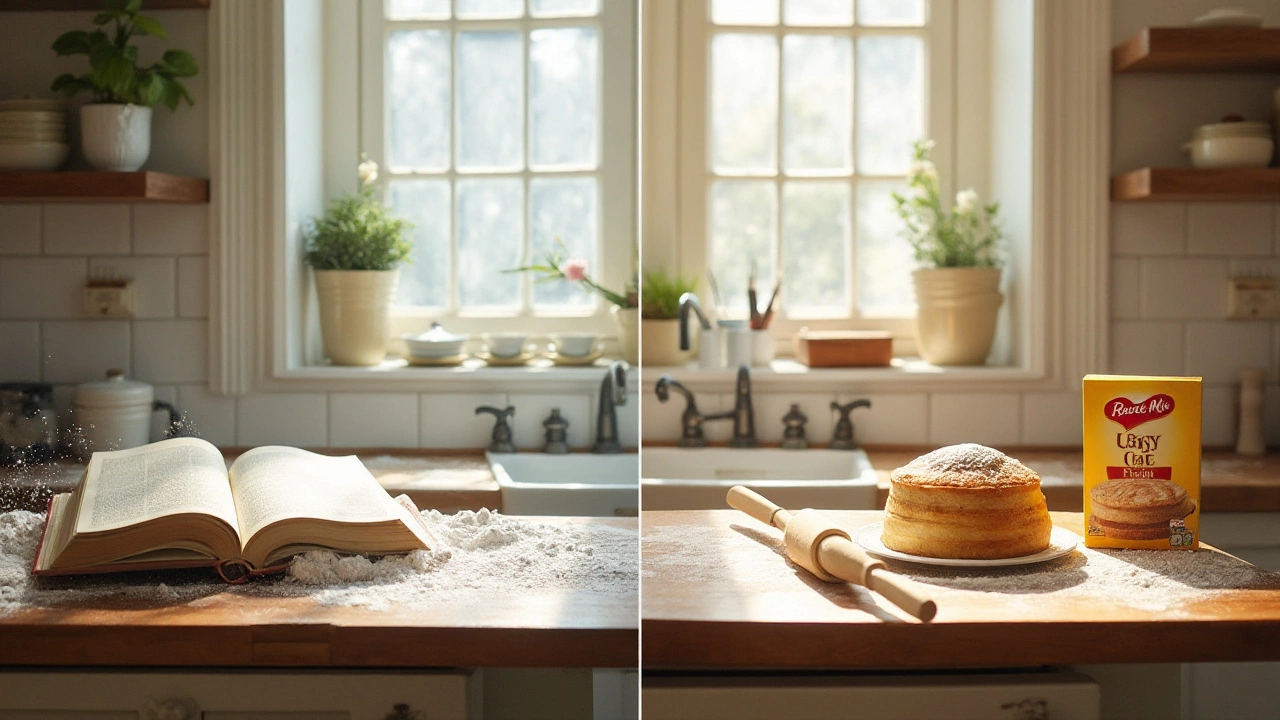
Nutritional Insights
When it comes to the nutritional profile of a cake, many might not realize how much difference their choice of a homemade cake or a boxed cake mix can make. Homemade cakes often provide the opportunity to be selective about what goes into them. From choosing organic flours, whole grains, or reducing sugar, baking from scratch allows for full control over the ingredients. This can be particularly important for those with dietary restrictions or those who are committed to a more wholesome diet.
On the other hand, boxed cake mixes are formulated to be quick and easy, which can mean they contain preservatives and additives that some prefer to avoid. Most mixes have a standard list of components that ensure stability and shelf-life, like hydrogenated oils and artificial flavors. However, these mixes have come a long way, with many brands now offering organic options and reduced sugar versions for health-conscious consumers.
"Eating healthy doesn't mean giving up the sweets you love. It's about finding ways to enjoy them while making smarter ingredient choices," says Nancy Clark, a well-known nutritionist.
In a comparison, the caloric content might not differ vastly between the two, but the nutrients delivered can. A homemade cake enriched with ingredients like dark chocolate, nuts, or fruits can offer additional fiber, vitamins, and antioxidants. But even a boxed cake can be enhanced nutritionally with a few simple swaps, like using applesauce instead of oil or adding pureed vegetables for moisture and vitamins.
Let's have a closer look at some general nutritional components that can be shared between homemade and boxed cakes:
- Fats: Both types of cakes typically contain fats, but homemade versions often allow choosing your favorite type, whether it be butter, coconut oil, or healthier options like olive oil.
- Sugar: The sugar content in cakes can be quite high, impacting the cake’s sweetness and texture. Homemade cakes allow the baker to control the amount and type of sugar used, while boxed mixes usually require following specific recipes.
- Protein: Eggs are a common source of protein in cakes. There are also eggless recipes available that use alternative protein sources like yogurt or flaxseed mix.
- Vitamins and Minerals: Incorporating fruits and nuts in your homemade cake can significantly increase the vitamin and mineral content, like vitamin E from nuts or vitamin C from fruits.
Whether the choice is for personalization or simplicity, both homemade and boxed solutions can present a wide range of nutritional options for those aiming to craft a birthday cake that is not only delectable but also aligns with health goals. Taking a little time to understand and tweak the ingredients can mean that slicing into that birthday treat is deliciously guilt-free.
Tips for the Perfect Birthday Cake
Creating the perfect birthday cake is an art that blends taste, texture, and presentation seamlessly. Whether you’re leaning toward a homemade cake or opting for a boxed cake, there are several tips you can follow to elevate your baking game. Start by ensuring all your ingredients are fresh and at room temperature; this simple step can dramatically impact the texture and flavor of your cake. Preheat your oven correctly to prevent uneven cooking, because an oven that's too hot or too cold can lead to disappointing results. Use a timer to track baking times accurately, but use a toothpick to test the center before deciding it’s done.
One vital aspect of cake-making is choosing the right pan size. If you use a pan that’s too small, your cake can overflow, and cooking could be uneven. Conversely, using a larger pan might leave you with a flatter cake. Greasing the pan well, or lining it with parchment paper, ensures your cake comes out easily without sticking or crumbling apart. Focus on the mixing process too; over-mixing can lead to a dense cake, so mix only until ingredients are combined. Creativity shines in your choice of flavors and fillings; consider adding a bit of espresso to chocolate cakes to enhance richness or citrus zest for a fresh burst of flavor in vanilla cakes.
Let's talk about frosting, which is just as important as the cake itself. Whether you're making buttercream or whipped cream, ensure it's not too stiff or too soft. The frosting should glide onto the cake smoothly, and considerations like flavor pairing should not be overlooked. For instance, cream cheese frosting pairs beautifully with red velvet. If you're feeling adventurous, introduce a variety of textures and flavors within layers. How about a surprise crunchy layer of praline or a fruity filling for a refreshing contrast? When decorating, patience pays off. Allow your cake to cool completely to avoid a melting disaster, and use an offset spatula to achieve a smooth finish.
Remember, presentation can make a huge difference. Consider how the cake will be displayed and cut. This simple step can enhance the overall dining experience and make the moment special. Use fresh flowers, edible glitter, or playful candies to adorn the top. A finishing touch of a personalized cake topper could leave a lasting impression. Always consider if your decorations are age-appropriate, and not too intrusive on the cake's flavor.
Culinary expert Julia Child once beautifully encapsulated, "A party without cake is just a meeting." Indeed, the perfect birthday cake stays in memory, not just as a dessert but as a focal point for bringing people together in celebration.
Whether you’re dealing with homemade cake or a boxed cake mix, following these tips can ensure your effort results in a delicious centerpiece for the celebration. Investing in quality ingredients, understanding the chemistry behind baking, and allowing your creative spirit to guide the final touches could very well make your next birthday cake a legendary one.


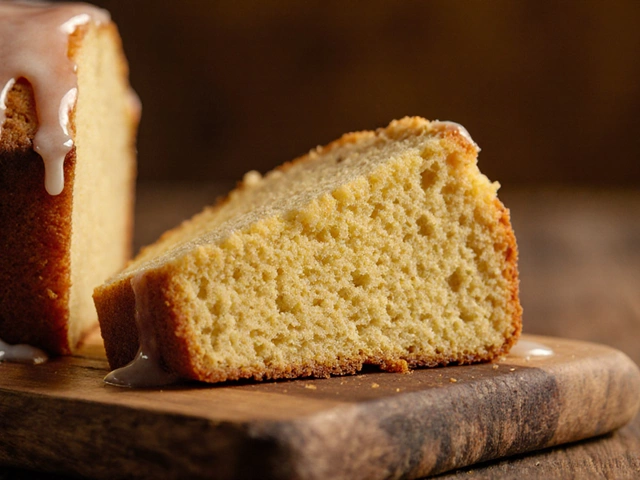
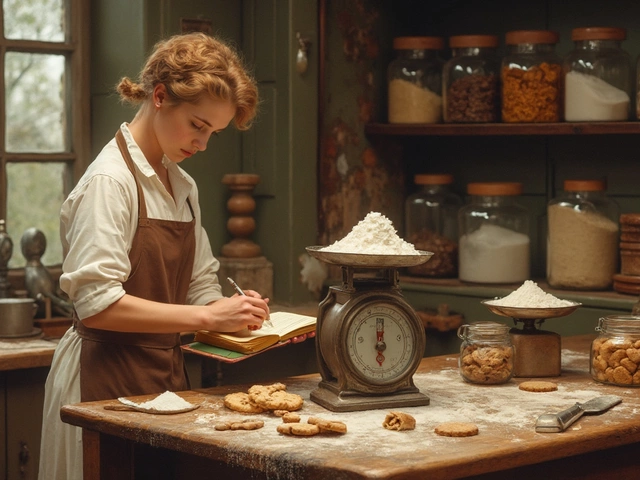


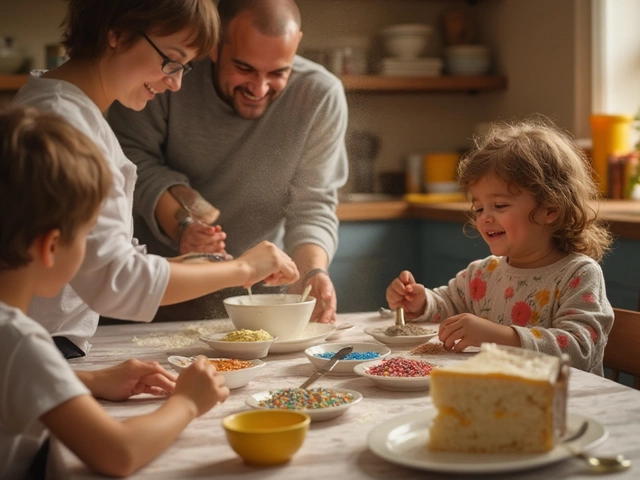
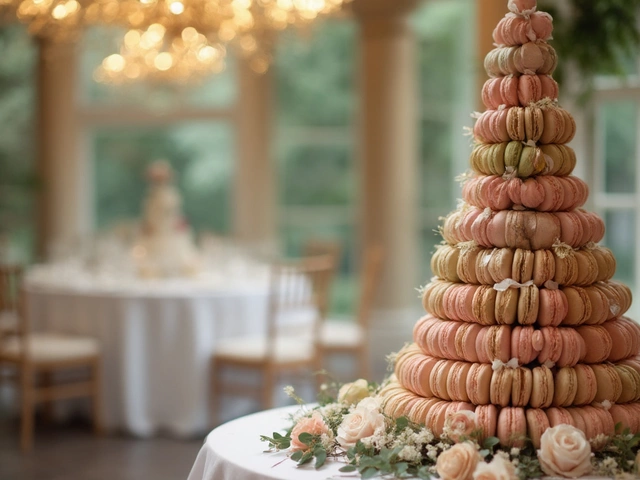

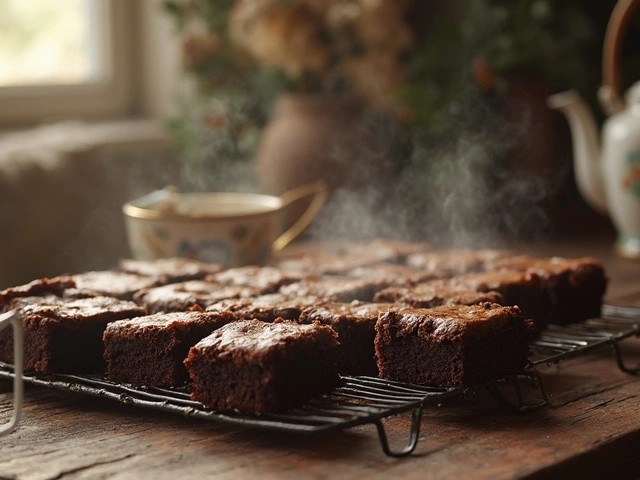

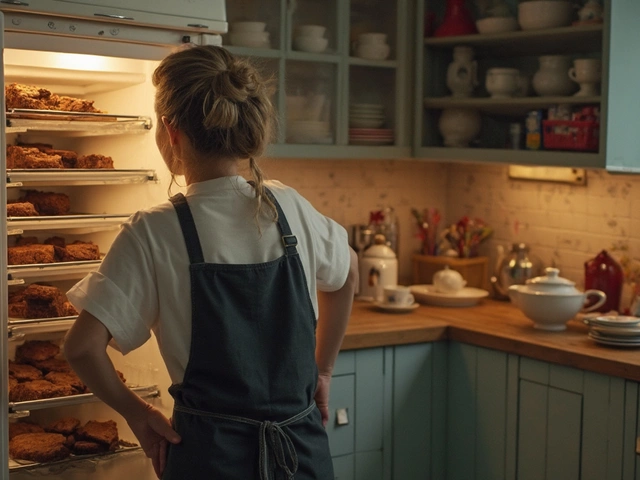
Write a comment